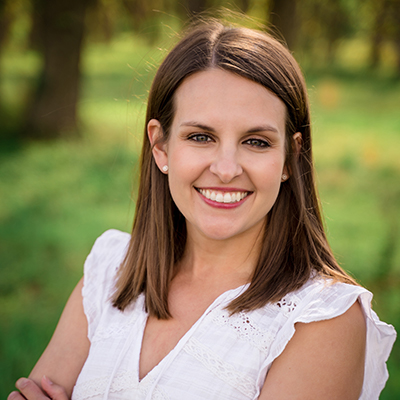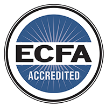Impact Stories

Connect With Our Experts
Feels Like Home
Displaced children often endure abuse, neglect and instability. But Oklahoma Baptist Homes for Children is helping hundreds transform their futures. Discover how your giving provides kids with love, hope and a purpose.
Editor’s Note: For security and privacy reasons, last names of children 18 or under have been omitted.
When Andrea was 5 years old, instead of playing with dolls, she was changing her baby sister’s diapers. Instead of playing house, she was trying her best to make dinner and was leaving meals outside her mother’s locked door. When Andrea’s father died of a brain tumor earlier that year, she lost any sense of a normal childhood.
“When my father passed away, it just about killed my mom,” Andrea remembers. “She had mental illnesses and after he was gone, she got really depressed. She stayed in her room all day, all the time. She never came out and she didn’t take very good care of me. I did my best to look after my sister.”
The girls were shuffled between foster care and family members for the next several years. By the time she was 9, however, Andrea and her family found themselves needing help as she struggled to adjust. That’s when her therapist told her about Oklahoma Baptist Homes for Children (OBHC), a not-for-profit Christian organization offering residential care for kids in need of a home.
“Honestly, at that point I thought that being anywhere else would be better than where I was,” Andrea remembers. “Even though OBHC was a new place where I didn’t know anyone, I felt like I was wanted, and it was really nice.”
Since 1903, OBHC has been caring for children like Andrea, providing a loving home and a supportive environment in which to grow physically, emotionally and spiritually. Children ages 6-18 live in cottage-like houses on four campuses across the state. Each cottage houses up to eight boys or girls who are supervised by houseparents. For many of the children, life at OBHC is the first time they’ve experienced a stable home environment.
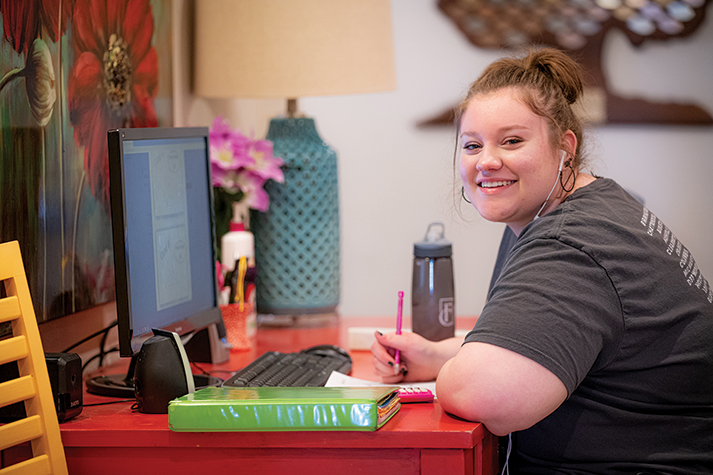
STUDY SPACE – 15-year-old Andrea enjoys studying in her cottage at OBHC. “I love school,” she says. “I currently have straight A’s!” While living on campus, children attend public school and have the space and structured quiet time to study and complete homework every day.
“We live in a society today where kids are orphaned even though their mom and dad are still alive,” says Greg McNeece, president of OBHC. “Mom or dad may be incarcerated, strung out on drugs, or have just completely abandoned their role as a parent and left a child to fend for themselves. The 200-plus kids we’re able to serve each day are what I call ‘social orphans.’ Mom or dad may be living, but they’re not in the picture whatsoever.”
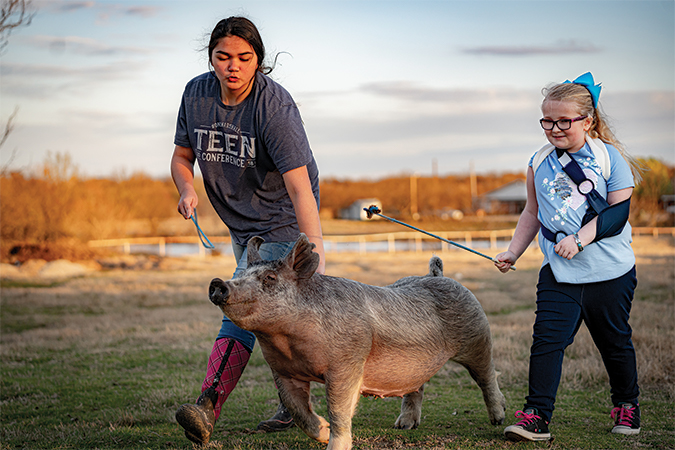
HERE PIG – 8-year-old Aurora (right) helps walk Patty the pig with her cottage sister Krysha. Aurora says helping with the livestock in the farm animal program is her favorite part of living at OBHC.
For 8-year-old Aurora, life at OBHC has brought a stability she’s never had before. After her grandmother died of a sudden illness, Aurora and her brother lived with several different family members before finding a home at OBHC.
“I think I’m going to have a better life here because I’m not bouncing all over the place now,” she says. “I’ve moved like nine or 10 times already!”
Like Aurora, many kids come to OBHC after being shuffled between extended family members. Sometimes their grandparents have health or financial problems that make them unable to care for the children. In some instances there’s tension between blended family members that makes for an emotionally unhealthy environment. For one reason or another, children are left with physical, emotional and spiritual needs that OBHC is able to meet by providing care in a supportive, Christ-centered home setting.
MORE THAN A PLACE TO LIVE
It’s the stability and routine of this everyday life that can be the most transformative for the children OBHC serves, McNeece explains. For once, they don’t have to worry about where their next meal will come from, how to survive in a house when the electricity has been shut off or who is or isn’t going to be there when they get home from school.
“OBHC allows them to be kids again,” McNeece says. “They get to experience life, grow and mature without worrying about adult issues that they shouldn’t have to face at such a young age.”
That’s exactly what 12-year-old Minor found at OBHC — refuge from the stress and pressure of responsibilities far beyond his age. Before he arrived, it was often left to him to take care of his two younger siblings in a chaotic home life that included parental drug abuse and neglect. Now Minor enjoys studying computer science at school, participating in the welding program offered at his OBHC campus and playing football and basketball with the other boys from his cottage.
“When I came here, I was afraid the other boys weren’t going to be nice and that the houseparents would be really strict,” he says. “But my houseparents are amazing. There are so many people here to comfort and help you. You know you’re supported.”
Minor’s houseparents, Brian and Leah Ingraham, have seen about 40 boys come through their cottage in the three years they’ve served at OBHC. Despite the common misconception, the Ingrahams say none of the boys are bad kids. They’re not there because they’re in trouble or on probation — they’re just children who’ve escaped a bad situation and simply need a loving home.
“Every family is broken,” Brian says. “That’s the problem. And almost every single one of them doesn’t have a dad. But we let the boys know that ‘You can stop the cycle of broken families.’ So much of the brokenness and poverty is self-inflicted. We tell them, ‘You guys don’t have to be that way. You can still love your parents and respect them, but you can change.’”
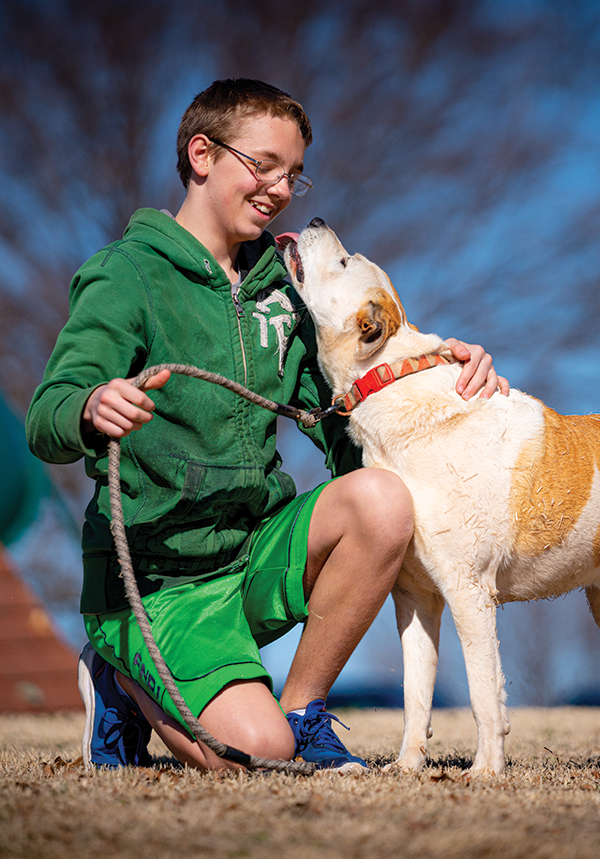
MAN’S BEST FRIEND – Twelve-year-old Minor gets a “kiss” from Ranger, a canine that’s part of Oklahoma Baptist Homes for Children’s Lucky Dog Program, where children learn to care for and train rescue dogs.
HEALING FAMILY TIES
Family reunification is one of the main goals that children at OBHC work toward. Those with families regularly go on weekend visitations. They also have access to counseling and, most importantly, witness daily modeling of healthy relationships in their cottage.
Henriatta Collins lived at OBHC’s Owasso campus for eight years as a teenager and young adult. Before she arrived at the children’s home at age 17, she was living with her two adult sisters when they became homeless. Because of her family’s dysfunctional relationships, she says she never knew any peace. But after only a few months at OBHC, she realized it was different.
“My perception of how families work and how individuals should treat others changed while I was there,” Collins says. “I saw you can actually have a home where you feel safe, loved and heard. I was starting to learn that chaos is not everywhere.”
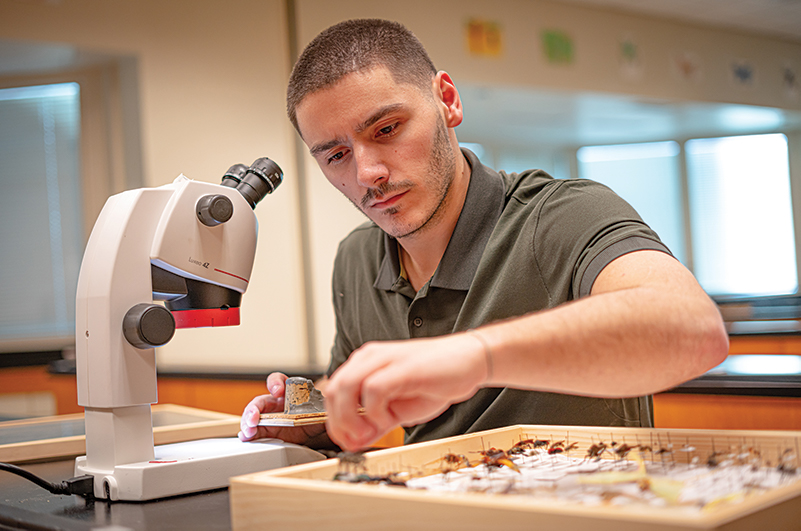
BRIGHT FUTURE – OBHC alumnus Shane Sellers works in the lab at Oklahoma State University, where he’s studying entomology. He says his time at OBHC as a teenager gave him the focus, motivation and skill set to get to college and work toward career goals.
For Shane Sellers, life at OBHC as a 16-year-old taught him how to forge quality friendships and serve as a role model to the younger boys in his cottage. Sellers is the first to admit he was the instigator of most of his troubles before he arrived at OBHC’s Boys Ranch Town. Often rebellious at home and involved in fights at school, he was hanging with the wrong crowd when he started skipping class and experimenting with drugs. Sellers credits his three-year stay at OBHC for healing his relationship with his parents and getting him to where he is now — a senior at Oklahoma State University making plans to attend grad school in the fall.
“The guy I was skipping school with back then is in jail now for like 15 years. If it weren’t for Boys Ranch Town, I’d probably be in the same boat,” Sellers says.
Children living on OBHC campuses learn many life skills needed to prepare them for a successful future, from work ethic and budgeting to study habits and personal responsibility. But the most important life skill taught is building and maintaining quality relationships, McNeece says.
“If they have healthy relationships, they’re going to be able to find contentment and happiness in life,” he explains. “At the end of the day, everything is about relationships. A spiritual walk with the Lord is built where? Well, it’s built on a relationship — a personal relationship with Jesus Christ.”
IMPARTING FAITH
Boys and girls come to OBHC from a broad spectrum of faith backgrounds. Some already know the Lord, while others have never set foot inside a church or opened the Bible. Through the spiritual guidance of their houseparents and twice weekly church attendance, the Gospel is spread through each cottage, meeting each child where he or she is.
Now 15 years old, Andrea has been living at OBHC for six years. Though she had heard about God before, she had a hard time believing that He loved her because of the bad things that kept happening in her life. After her mom died, Andrea became so depressed she started cutting herself and thinking about suicide. While attending church camp with her cottage, she heard a Gospel message that radically changed her life.
“I remember I felt God for the first time,” Andrea says. “I thought about everything that had happened and I realized that I was wrong — I wasn’t alone. People did care about me. My biggest dream was always to have a family. I never really thought about the people at OBHC being my family until then. I realized God had actually given me everything I wanted. It was right in front of me the entire time.”
Andrea gave her life to Christ that night and celebrated with friends in her cottage and her houseparents.
Collins, who now works with children as a mental health therapist, also credits OBHC for her relationship with Christ and her ability to let go of her past. When she first arrived at OBHC, Collins struggled with low self-esteem and remembers being angry all the time. But after learning about who God is, her attitude started to shift.
MISSION STATEMENT – To demonstrate God’s love by providing hope through empowering children and their families to follow Christ.
“My heart changed from a bitter, angry, resentful person to the kind and compassionate person that God wanted me to be,” she says. “It was because they said Christ loved me. And then Christ came into my heart and everything changed.”
OBHC encourages spiritual growth in all the children they serve by providing a Christ-like example, McNeece says. Houseparents share what it means to have hope not only in this life, but in a life to come.
“It’s up to us to model a Christian life for them and to have those conversations, when appropriate, about salvation and what Jesus came to the world to do,” he explains. “We don’t browbeat them with the Gospel, but we help them understand that there is a reason for what we do, and His name is Jesus.”
YOU CAN HELP CHANGE LIVES
For many children, coming to OBHC is a big lifestyle change — escaping poverty, homelessness or neglect and transitioning to a home where they are well-provided for.
“Growing up, we were always really poor,” Sellers recalls. “It was cool coming to the Ranch (a nickname for OBHC’s Boys Ranch Town campus). They’ve got the pool, horses, this big yard and basketball courts. The food is always fresh and there are always three meals a day. It was actually a really big culture shock.”
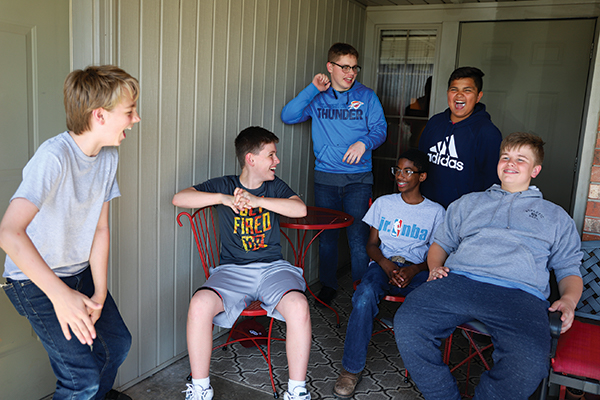
KIDS AGAIN – 12-year-old Minor (far left) jokes with the other boys in his cottage at OBHC. Since living here, Minor says the pressure of taking care of himself and his siblings has been taken off and he feels like he can be a kid again.
Though OBHC is the largest not-for-profit provider of residential childcare in the state, the organization accepts no government funding and never charges for services. Instead, OBHC is supported entirely by the generosity of individuals and families.
“Donors make it happen day-in and day-out,” McNeece says. “We have the worst business model in the world: we give away everything we raise.”
OBHC needs approximately $12 million each year to operate. By not accepting state or federal funding, the organization is able to retain its autonomy and independence, which allows for a direct emphasis on the Gospel in the homes. But it also means any change in donors’ giving patterns can directly affect the children OBHC serves.
“If we can’t make our budget, we can’t pay salaries and we have to close cottages,” McNeece explains. “In an organization like ours that generally runs at full capacity, if we close a cottage, it means eight kids have to go somewhere else to live.”
McNeece adds that donors who support OBHC through the organization’s endowment with The Baptist Foundation of Oklahoma can help mitigate the ups and downs of annual giving cycles. That’s because endowment is designed to provide a continuous source of financial support that multiplies a donor’s gift many times beyond the original amount. When people give to OBHC through endowment, their gift is invested and a portion of the growth is used to fund OBHC’s operations each year. The remainder is reinvested to preserve and grow the original gift. This cycle creates a perpetual income stream that will help meet the organization’s future needs.
“OBHC’s endowment allows us to more accurately budget for our needs each year, avoiding unnecessary cuts to services,” McNeece explains. Donors rely on the Foundation’s planned giving professionals and biblically grounded asset management strategies to ensure OBHC’s ability to continue providing hope and homes for children for generations to come.
Beyond guaranteeing OBHC’s long-term stability, more donors are needed, not only to meet annual budget needs, but to respond to the ever-growing numbers of children who need care. Additional funding allows OBHC to build new cottages and hire more houseparents, which means even more displaced children can have a home.
Serving as houseparents, the Ingrahams have a front-row seat to witness the transformative impact that a donor’s gift can make on the children in their care. They often remind the boys that life isn’t free, but the things they enjoy at OBHC have been generously provided by people who love God.
“They see that God is real, that He’s involved here and that He’s providing this,” Leah Ingraham says. “Through the blessings of this home, when we get to take them to an amusement park or on vacation in the summer, we point it back to God, and that’s big because those are things they can see and touch.”
As children at OBHC approach high school graduation, their houseparents and case workers help them develop a plan for leaving the cottage. If reuniting with their family is not an option, OBHC offers a transitional housing program for those continuing their education in college or trade school. These apartment-like homes allow for more independent living while teaching self-sufficiency and personal responsibility.
Though life won’t be perfect once children leave OBHC, the Ingrahams know the seeds they help plant in kids’ lives will bear fruit, even if they never get to see it. That was true for Lacey Spencer, a 32-year-old mother of two who lived at OBHC’s Owasso campus for six years as a child. Now supporting herself and working toward buying her first home, she remembers her years at OBHC as the most stable of her childhood.
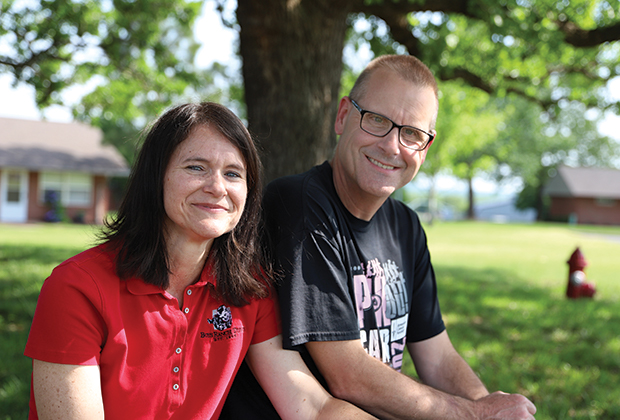
PLANTING SEEDS – Leah and Brian Ingraham say they feel called to serve as houseparents at OBHC and share the love of Jesus on a daily basis with the boys in their cottage. The Ingrahams have mentored more than 40 boys during the three years they’ve served as houseparents. Through group devotions and Scripture memory, the couple plant seeds by getting the kids in the Word every day.
“They offer a safe haven and they give you a place to call home,” Spencer says. “When you leave, you can choose to follow the path that they’ve shown you, or you can follow a different path. Either way, they give you all the tools you need to change your life.”
Give Children A Place To Thrive
OBHC neither charges families for its services nor accepts government funding, which makes the organization’s Gospel emphasis possible. Instead, OBHC depends on the generosity of donors like you. Contact the Foundation’s planned giving professionals today to multiply your gift’s impact.
give@WatersEdge.com | 800-949-9988 | WatersEdge.com

